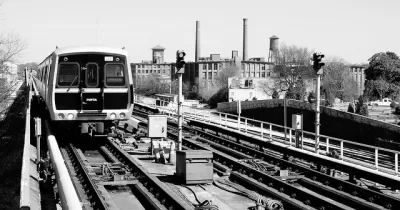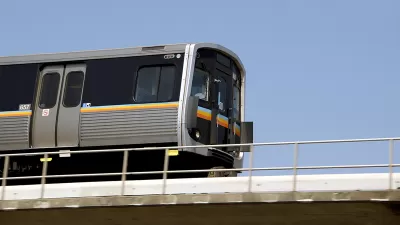Gwinnett County voters living have rejected proposals to pay taxes for the MARTA transit system before, so the latest proposal for a transit sales tax is going to great lengths to prove its local control bonafides.

David Pendered reports on the central role of the politics of local control to the transit sales tax on the ballot in November for voters in Gwinnett County, Georgia.
"MARTA will be involved only because state law requires it – and the role is restricted to heavy rail," writes Pendered. "MARTA is equally explicit in stating that Gwinnett County will exercise control over MARTA’s functions in Gwinnett through intergovernmental agreements. These agreements will help address the fact that Gwinnett County does not have a representative on MARTA’s board – because Gwinnett voters have rejected proposals to join MARTA."
According to Pendered, the transit sales tax proposal is designed to keep the revenue raised by the tax out of MARTA coffers, funding instead projects and programs favored by local officials.
The possibility of a regional approach to transit funding and planning has buried previous transit funding sales taxes proposed to Gwinnett County voters, despite the best rhetorical efforts of transit advocates in the Atlanta region.
In response to that history of reluctance to send tax money to a regional authority, "Gwinnett County’s official educational materials regarding the transit proposal – Your plan, Your vote, Your choice – has an entire section that’s titled, Local Control," explains Pendered.
The county has done more—a lot more in fact—to highlight the local control embedded in November's ballot proposal, as shown by Pendered in the source article.
FULL STORY: Gwinnett County transit vote: Local control is the watchword

Planetizen Federal Action Tracker
A weekly monitor of how Trump’s orders and actions are impacting planners and planning in America.

San Francisco's School District Spent $105M To Build Affordable Housing for Teachers — And That's Just the Beginning
SFUSD joins a growing list of school districts using their land holdings to address housing affordability challenges faced by their own employees.

The Tiny, Adorable $7,000 Car Turning Japan Onto EVs
The single seat Mibot charges from a regular plug as quickly as an iPad, and is about half the price of an average EV.

As Trump Phases Out FEMA, Is It Time to Flee the Floodplains?
With less federal funding available for disaster relief efforts, the need to relocate at-risk communities is more urgent than ever.

With Protected Lanes, 460% More People Commute by Bike
For those needing more ammo, more data proving what we already knew is here.

In More Metros Than You’d Think, Suburbs are Now More Expensive Than the City
If you're moving to the burbs to save on square footage, data shows you should think again.
Urban Design for Planners 1: Software Tools
This six-course series explores essential urban design concepts using open source software and equips planners with the tools they need to participate fully in the urban design process.
Planning for Universal Design
Learn the tools for implementing Universal Design in planning regulations.
Smith Gee Studio
City of Charlotte
City of Camden Redevelopment Agency
City of Astoria
Transportation Research & Education Center (TREC) at Portland State University
US High Speed Rail Association
City of Camden Redevelopment Agency
Municipality of Princeton (NJ)




























